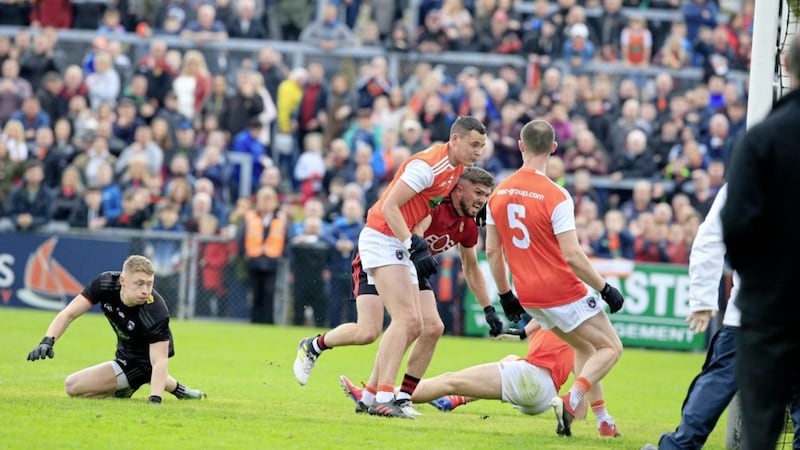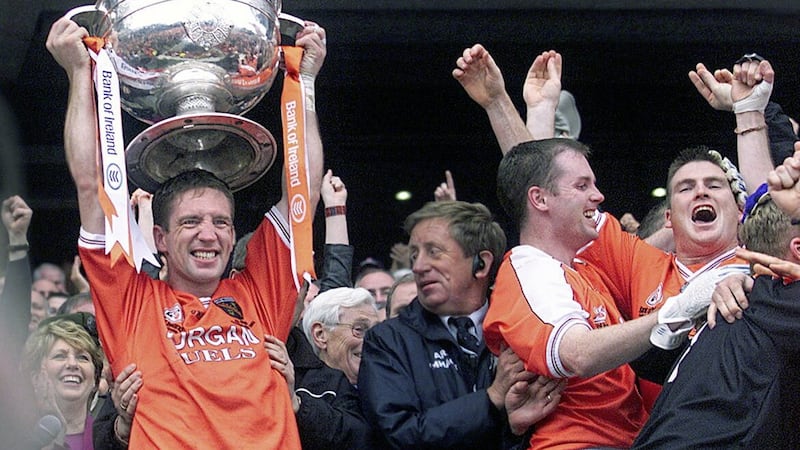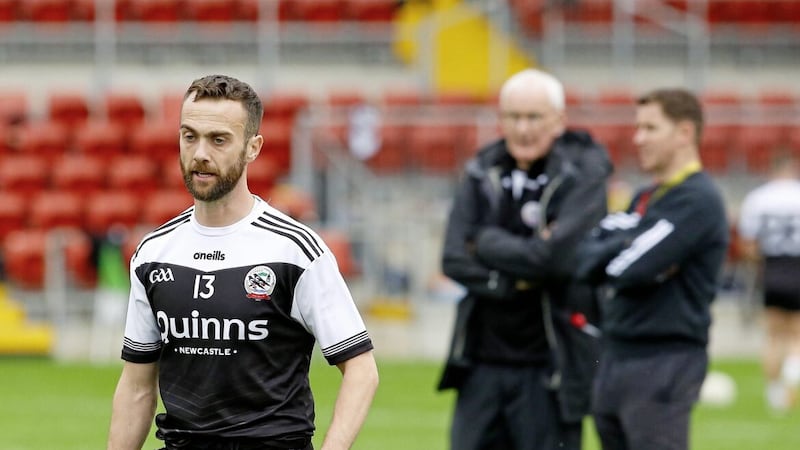IN the year that’s in it, a retired Offaly forward that broke little delft in the rest of his career will be the most referenced name in Gaelic football.
The mention of Seamus Darby draws him into company with the likes of Ray Houghton, Ronan O’Gara, Eamonn Coghlan, Dennis Taylor. Those that, when their names are mentioned, appear like a genie from a bottle in the form of that one career-defining image.
By the time August ends, you’ll have seen Darby’s goal against Kerry so often you’ll be able to recite Micheal Ó hÉihir’s famous soliloquy from beginning to end.
“Here they come. This is Liam O’Connor, the full-back. A high, lobbing, dropping ball in towards the goalmouth. A shot. A goal! A goal! A goal for Offaly! There was a goal in the game!”
It’s the excitement in the commentator’s voice as the ball hangs in the air, his mind anticipating that Darby might just lean heavily enough on Tommy Doyle’s back so as he might win the ball.
That after five years of watching Kerry build a dynasty, they might just be denied the five-in-a-row.
That Offaly will find something in the pit of their guts that will leave the scriptures needing a reprint.
The moment’s method was the order of the age. The long ball.
The key to the long ball is in three parts.
A) It must be timed right.
B) It must be delivered right.
C) And it must be kicked to the right man.
Get those three things right and, 37 years on from Darby’s famous moment, it is still the most dangerous weapon in a widened and modernised artillery.
At times, Armagh’s win over Down on Sunday was a thoroughly modern game of football. Both teams packed their defences and played on the counter-attack.
Armagh’s inability to hold the lead in the final five minutes led to a dramatic conclusion, and while the changing of hands of the lead made it exciting, it doesn’t fulfil nearly enough of the other criteria for being labelled as a classic.
What it did provide, however, was a few key moments in which the oldest trick in the book was rewarded.
Both teams had such joy off the long ball precisely because they didn’t overuse it.
In his commentary on BBC Radio Ulster, former Derry forward Conleith Gilligan was lamenting the way in which Paddy Tally’s team had failed to utilise it at all early on.
Within seconds, Gerard Collins was floating one on top of Pat Havern, who got above Brendan Donaghy to flick the ball into the net.
Collins wasn’t lumping it in aimlessly. This was after 22 minutes, which they’d largely spent probing for runners into the gaps.
Because of that, Armagh had taken their eye off the ball. Their spare men in defence were all pushed out towards the 45’, waiting to meet those coming at pace.
Havern was one-on-one with Donaghy, right in the middle of the goal, 10 yards out. (See criteria A).
Collins gave the ball in loads of hang-time, allowing Havern to manoeuvre his body right beneath it. (See criteria B).
Havern is a goalscorer. He saw it coming and dropped off to the far post to allow himself a run on it. He had the height on Donaghy. (See criteria C).
The goal with which Donal O’Hare rescued extra-time came off the same tactic. It was more of an act of desperation, kicked into a 3v2 situation, but it made up for that by fulfilling its other duty: causing anarchy.
It was exactly the same type of chaos that gave Paul Devlin a goal from 55 yards at the very end of the game.
No matter how many covering men you might have in front, there are very few full-backs that enjoy being planted in the exact spot where the ball will land, six yards from their own goal, while the forward takes a few steps outside to get a run at it and waits for the hanging ball to drop.
Back in the day, most goalkeepers relished it as a chance to use the knees to smash a few ribs. The first one would have marked the territory. Seeing a team-mate in a crumpled heap in the square was usually enough to dissuade any future would-be trespassers.
Fewer goalkeepers in the modern era are that keen on it. They don’t know what their knees are for.
Throw in the change to the square ball rule that allows the forward to come charging in and offer some historical retribution for years of oppression.
Ultimately, the aim of a massed defence and playing with two and three sweepers is to remove the anarchy from the game.
With ultra-defensive tactics wrapping themselves like ivy around the sport for a long spell at the beginning of this decade, the long ball that Kerry had brought back with such a bang in 2006 went out of fashion again just as quickly.
Teams became so frightened of the risk that they forgot about the potential reward.
A total of 4-4 came off long balls in Páirc Esler on Sunday.
Rian O’Neill’s delivery for Andy Murnin’s won the game. The ball in was so unexpected that Daniel Guinness, the Down sweeper at that stage, was standing 15 yards in front of his full-back.
That was Conor Poland, who didn’t see it coming either. Murnin is in behind him, and such is the pace on the ball that all it needs is a touch. He delivered a bit more than that, but fortune favoured the brave.
And wouldn’t it be ironic (is that the right word Alanis?) were Dublin’s bid to surpass that great Kerry team by winning five-in-a-row to be flattened by a long ball.
It has long been the one strand that has threatened to trouble them. As much as they were railroaded in the end, Laois were the one team in the last two years to properly lay the fight to Dublin with their directness in the opening part of last year’s Leinster final.
Rory O’Carroll or not, if the long ball is used right against Dublin this summer, it has the potential to allow us to draw an eternal comparison back to 1982.
For all that the sport has advanced, sometimes it still pays to just kick the f***ing thing in.








